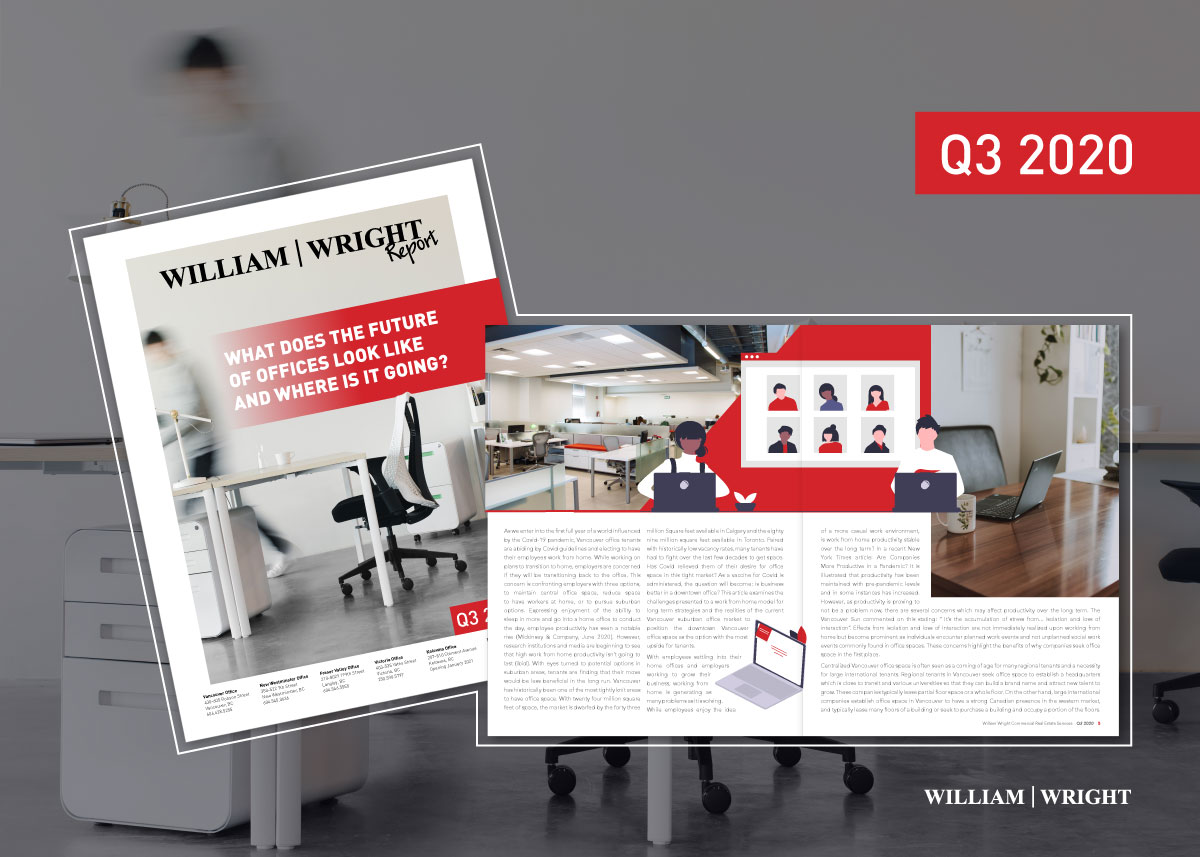
As we enter into the first full year of a world influenced by the Covid-19 pandemic, Vancouver office tenants are abiding by Covid guidelines and electing to have their employees work from home. While working on plans to transition to home, employers are concerned if they will be transitioning back to the office. This concern is confronting employers with three options, to maintain central office space, reduce space to have workers at home, or to pursue suburban options. Expressing enjoyment of the ability to sleep in more and go into a home office to conduct the day, employee productivity has seen a notable rise (McKinsey & Company, June 2020). However, research institutions and media are beginning to see that high work from home productivity isn’t going to last (ibid). With eyes turned to potential options in suburban areas, tenants are finding that their move would be less beneficial in the long run. Vancouver has historically been one of the most tightly knit areas to have office space. With twenty four million square feet of space, the market is dwarfed by the forty three million Square feet available in Calgary and the eighty nine million square feet available in Toronto. Paired with historically low vacancy rates, many tenants have had to fight over the last few decades to get space. Has Covid relieved them of their desire for office space in this tight market? As a vaccine for Covid is administered, the question will become: is business better in a downtown office? This article examines the challenges presented to a work from home model for long term strategies and the realities of the current Vancouver suburban office market to position the downtown Vancouver office space as the option with the most upside for tenants.
With employees settling into their home offices and employers working to grow their business, working from home is generating as many problems as it is solving. While employees enjoy the idea of a more casual work environment, is work from home productivity stable over the long term? In a recent New York Times article: Are Companies More Productive In a Pandemic? It is illustrated that productivity has been maintained with pre-pandemic levels and in some instances has increased. However, as productivity is proving to not be a problem now, there are several concerns which may affect productivity over the long term. The Vancouver Sun commented on this stating: “It’s the accumulation of stress from… isolation and loss of interaction”. Effects from isolation and loss of interaction are not immediately realized upon working from home but become prominent as individuals encounter planned work events and not unplanned social work events commonly found in office spaces. These concerns highlight the benefits of why companies seek office space in the first place.
Centralized Vancouver office space is often seen as a coming of age for many regional tenants and a necessity for large international tenants. Regional tenants in Vancouver seek office space to establish a headquarters which is close to transit and various universities so that they can build a brand name and attract new talent to grow. These companies typically lease partial floor space or a whole floor. On the other hand, large international companies establish office space in Vancouver to have a strong Canadian presence in the western market, and typically lease many floors of a building or seek to purchase a building and occupy a portion of the floors. Most notably, B2Gold Corp. which recently leased 3 floors in the 666 Burrard Building and Amazon taking up more than one million square feet of space around Vancouver with plans to bring on six thousand new jobs to Vancouver. With the prevailing quality of the inventory available in Vancouver, large international tenants are having no issues with absorbing new spaces. Regional tenants, however, have begun to steer their eyes to the suburbs. Suburban offices present more challenges for regional tenants as the available inventory typically presents lower upside for business growth. In a Vancouver Sun article it is discussed that developers typically lean to residential developments in suburban areas and only build office buildings where required. Furthermore, available suburban offices have less transit accessibility and fewer local amenities. While new developments are on the rise in Suburban areas, their windows for completion do not adequately fall into the short term demand brought by Covid-19.
Is business better in a downtown office? While working from home has proved itself to be a case study for the short term, there are serious concerns to whether or not employers can maintain the work from home model into the future. Additionally, office space in suburban areas is not at the place it needs to be to fully satisfy the needs of downtown office tenants. With the planned and unplanned social situations that happen in an office, businesses will find it easier to collaborate, onboard, and grow their businesses. While Vancouver continues to have the quality of space, amenities, and transit accessibility, its office market will continue to provide unparalleled upside for its tenants.
Written by Liam Simpson for William Wright Commercial
This communication is not intended to cause or induce breach of an existing agency agreement. E&OE: All information contained herein is from sources deemed reliable, and have no reason to doubt its accuracy; however, no guarantee or responsibility is assumed thereof, and it shall not form any part of future contracts. Properties are submitted subject to errors and omissions and all information should be carefully verified. All measurements quoted herein are approximate.
ⓒ William Wright Commercial Real Estate Services 2024
Proudly designed by Burst Creative